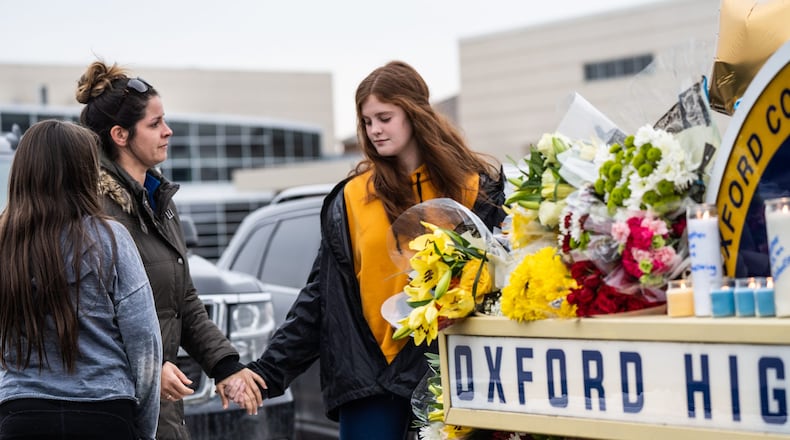Damian Galvan is a politically active student in Forsyth County where he is a high school senior. In this guest column, Damian denounces the lack of efforts to reduce gun violence, which has become a constant and feared presence in the lives of American students.
With his best friend and fellow Forsyth student Varoon Kodithala, Damian started the podcast Polititeen, saying, “I believe that conversations, whether they be locally, nationally, or globally, are crucial to creating progress.”
By Damian Galvan
You continue to fail us.
In late November, four students at Oxford High School outside Detroit were shot dead and an all-too-common pattern began. Headlines focused on gun regulations and school shootings. Politicians who have not been inside a classroom in decades attempt to persuade us on the matter. The NRA telling us that good guys with guns are the solution. News commentators telling us that regulations and background checks are the way to overcome this epidemic of gun violence.
Then, as quickly as a bullet leaves the chamber of a gun, the discourse will dissipate. However, for teachers and students alike, the conversation never ends. Active shooter drills, PowerPoints on warning signs and banners reading “See something, say something” visible throughout the school.
I do not offer this perspective as a journalist or career politician but as a student. Although this school rampage occurred while I am a senior, shootings in years past, much like the PowerPoints or shooter drills, became staples of my academic career.
The shootings present themselves as a tragic timeline to my own school journey, from the 2008 Northern Illinois University shooting that killed five students that took place when I was in preschool to the Oxford High shooting in my senior year of high school.
I particularly recall the day after the 2018 shooting at Marjory Stoneman Douglas High School in Parkland, Florida. The feeling throughout my own Georgia high school was ominous. As I exited my first-class period, I observed two sheriff deputies monitoring the hallway with bulletproof vests and military grade assault rifles. I was escorted to my Georgia studies class.
While I actively experience these events; it has been through hindsight and retrospect that I have gained the greatest amount of insight onto the matter — nothing will ever change.
There is no better proof of this than Dec. 14, 2012, and the days following. Twenty children and six adults were shot dead at Sandy Hook Elementary. Nothing changed.
Being only 8, I didn’t process the Sandy Hook massacre at the time. But now, at almost 18, it becomes apparent: America does not care about me or my classmates.
If the death of 20 elementary school children in Newtown, Connecticut, cannot bring substantive change, what will? Who has to die for us to acknowledge guns and easy access to them are an issue? More importantly, who needs to die for us to acknowledge we are the problem?
I believe there were 12 victims on Nov. 30 in the Michigan high school shooting. The four students shot dead, the seven injured, and the alleged 15-year-old shooter. Do not misunderstand or misrepresent my position. The teen charged in the killings deserves to face consequences.
However, he is also a victim. He is the victim of a culture that our society has cultivated. We have become numb to not only the imminent danger that guns themselves present, but the shootings themselves.
We fail to provide adequate resources to treat those with mental health issues. We choose to ignore cries for help.
The warning signs always seem to be apparent and the Oxford High School shooting did not deviate from this. In the aftermath, people usually ask: “How did we miss the signs?” However, as these tragedies occur more frequently, the question asked now is: “Why did we choose to ignore the signs?”
The day before the shooting, a teacher saw the alleged shooter “viewing images of bullets on his cellphone during class,” according to news reports. That led to a meeting with a counselor and another staff member, where they were told “shooting sports are a family hobby,” according to a letter from a school official.
Just hours before the mass shooting, a teacher found a drawing by the student that that featured a gun and a bleeding figure with the words: “The thoughts won’t stop” and “Help me.”
The student’s parents were called to the school, according to school officials. The student was allowed to remain.
After the deadly shooting, police said the weapon used during the Oxford High School was purchased four days earlier.
We as a society have become numb to the danger of guns and the consequences are showing. However, as long as gun lobbyists maintain power and influence, nothing will ever change.
But we must have hope. We must continue to fight. Because nothing will ever change unless we change it. Although at times the conversation feels hopeless and the deaths in vain, we must never forget the light at the end of the tunnel.
We need to create an environment where discussing mental health issues is no longer taboo, where the warning signs are no longer ignored and where we no longer fear for our lives while sitting in a classroom.
About the Author
The Latest
Featured




